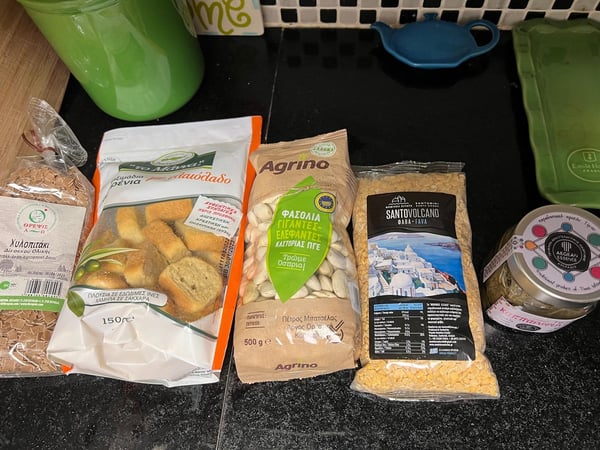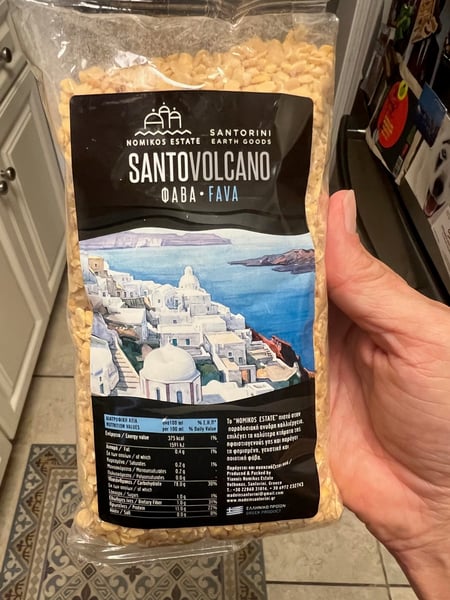When I left Greece last fall, I came home with a suitcase full of Greek ingredients. What better way to put them to use than to cook for my travel partner on that trip Cheryl and her life partner Joseph who is from Athens? No pressure at all!

Santorini Fava is what’s known as a ‘Protected Designation of Origin’ or PDO. That’s because the particular beans grown on the island in the rich volcanic soil and have been grown there exclusively for 3,500 years! In order to have the designation, the beans must come from the island. They have a velvety texture, and they taste slightly sweeter than other fava beans. I fell in love with this dish during our cooking class, so I made sure to purchase a bag before leaving that winery.

Gigantes Plaki
Scroll down for a printable version of this recipe
Adapted from My Greek Dish
Serves: 8
Prep time: 15 minutes
Cook time: 3 hours, 15 minutes
Inactive time: 12 hours
1 pound gigantes beans
1/2 cup olive oil
2 cloves garlic, minced
1 large onion, diced
1/2 cup parsley, chopped
1 stalk celery, diced
1/2 cup hot water
28 oz. canned crushed tomatoes
1 teaspoon dried oregano
Salt and pepper, to taste
1. Soak the beans in water overnight. Drain and rinse with water.
2. Preheat oven to 350 degrees.
3. Place the beans in a large pan with enough water to cover them and bring to a boil.
4. Boil for 15 minutes.
7. Remove the foil and bake for another 30 minutes.
8. Adjust seasoning and serve.
I finished the meal with dessert of a Greek honey cake called Melopita. I used this recipe from My Greek Dish which is basically a crustless ricotta cheesecake. It couldn't be simpler to make! You just mix all of the ingredients together, pour into a prepared springform pan and bake for about a half hour.
If you want to be introduced to new ingredients and ethnic cuisines, The Chopping Block is the place to start and no passport is required! Here are just a few of the classes we have coming up that will help you feed your curiosity.
- Virtual Chicken Piccata Friday, April 21 6:30pm CST
- Hands-On Vegetarian Mexican Tuesday, April 25 6pm
- Hands-On Gluten-Free Italian Night Out Wednesday, April 26 6pm
- Virtual Sweet and Savory Crepes Friday, April 28 6pm CST
- Hands-On April in Paris Saturday, April 29 6pm
Gigantes Plaki
Ingredients
- 1 pound gigantes beans
- 1/2 cup olive oil
- 2 cloves garlic, minced
- 1 large onion, diced
- 1/2 cup parsley, chopped
- 1 stalk celery, diced
- 1/2 cup hot water
- 28 oz. canned crushed tomatoes
- 1 teaspoon dried oregano
- Salt and pepper, to taste
Instructions
- Soak the beans in water overnight. Drain and rinse with water.
- Preheat oven to 350 degrees.
- Place the beans in a large pan with enough water to cover them and bring to a boil.
- Boil for 15 minutes.
- Drain and place into a large baking dish. Add remaining ingredients.
- Cover with aluminum foil and bake at 350 degrees for approximately two and a half hours.
- Remove the foil and bake for another 30 minutes.
- Adjust seasoning and serve.
